Nurses are known for their calm under pressure and the high-quality medical care they provide day in and day out. But they are also well known for another quality–their kind-hearted approach to the patients in their care.
Of course, sometimes the best nurses have to give a little tough love, but even that comes from a place of concern and care. For all their kind-hearted ways, nurses can remember they need to share that kindness with themselves, particularly when they are talking about their own heart health.
With February’s American Heart Month wrapping up, now is a good time to take stock of small changes you can make that can have a big impact on your own heart health. As a nurse, you already know all the big ways to make changes, but it’s a lot easier to focus on small steps for lasting effect.
Because your heart health has a ripple effect throughout your body, keeping your heart in good shape leads to overall health improvements. Here are a few ideas to get you thinking about putting yourself, and your own health, front and center.
Look at Your Food Like a Nurse
If one of your patients had your diet, what would you think of it? Would you give it high scores for overall excellence, a mediocre score for “could do better,” or a flat-out failing grade? How would you convey the news that a diet needs an overhaul to a patient? Nurses would tend to offer compassion to their patients because they know how challenging it is to change. That’s how you should approach assessing your own eating habits. If you’re stress-eating chips or chocolate, you’re not going to feel at the top of your game. And if you’re skipping meals because you’re too busy, you won’t have enough energy to manage everything.
Need to make a few changes? You already know what a heart healthy diet looks like, so just set the bar at a low point–make it easy to reach your goals. Bringing a bag of baby carrots to swap for your afternoon crunchy go-to like chips or crackers. Do that once or twice a week. Toss an apple and a couple of cheese sticks in your bag so you can have something healthy when you have a second to spare to eat.
What Do You Tell Patients About Rest and Heart Health?
Nurses aren’t resting enough right now–forget about sleeping enough. But you know how a body can’t recover unless it can rest. The same goes for overworked nurses. Just like your diet, set a low bar–aim for getting a more restful period once or twice a week. Start with 15 minutes of sitting with your eyes closed (a beautiful spot would be ideal, but if it’s in the bathroom with the door locked, so be it). If you can take a 30-minute nap, great; if you can’t, just a few peaceful moments can reduce your blood pressure and help your heart.
How’s Your Network?
A network of supportive folks–not your professional network, although that can help–makes your burden lighter. When you feel you have people who you can talk to, who support you, who listen and don’t judge, then you have some excellent protection for your heart. You may not see them much, but you know they are there and that gives your heart health a real boost. Make small improvements here, too. If there’s no time to see your favorite people, have a group call or Zoom or check in with a group text. Funny videos, supportive sayings, or beautiful photos go a long way toward bringing people on the same page. If you need more connections, check out a local group with a common interest.
Move It
If you’re on your feet all day, the thought of a workout can seem like a chore. But if you find something that’s fun and that you like (and if you’re social, find something you can do with others), getting more movement won’t feel like the last thing you want to do. Like before, start with a small goal and see how you do. Walk around the block once on a beautiful evening or do some gentle stretching before you go to bed. Yes, getting your heart rate up is most beneficial by far, but the benefits of gentle movement can’t be overlooked. Smaller movements are relaxing and can help lower blood pressure. Stretching can decrease the stiffness in your arteries and help improve blood flow–all good for your heart.
- WOC Nurses Week Highlights Specialty - April 16, 2024
- Honoring Radiology Nurses Day on April 12 - April 12, 2024
- Travel Offers New Career Possibilities - April 8, 2024



